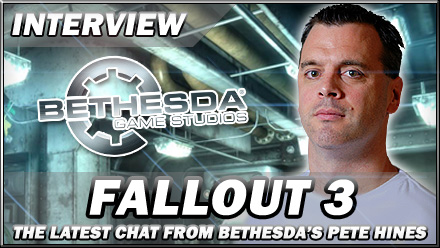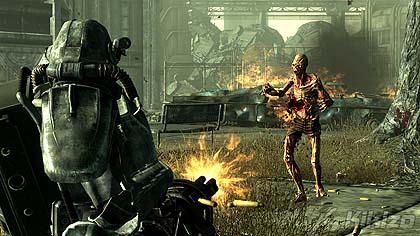Bethesda Fallout 3 Interview Feature
Fallout returns this year with a new team behind the radioactive wheel. We sit down with Bethesda's Pete Hines to find out more.

There's no doubt about it - games are getting shorter. It's getting to the point where an action game with a playtime that flirts with double-digits seems abnormal. But thankfully there are some developers with the confidence to go long.
"I can tell you what you're going to be doing every minute of Call of Duty 4," says Pete Hines. "Don't get me wrong. That game is fucking brilliant - it's so well done. But I can tell you exactly what happened in every single mission, within very small parameters. This, you can be 10 hours in and I bet you I couldn't event get 20 to 30 per cent of what you would have done."
"This", of course, is Fallout 3, Bethesda Softworks' follow-on to Black Isle's beloved series, and Hines, faceman at publisher-slash-developer Bethesda, is the game's biggest cheerleader. Hines is at long last in London, taking care of the remaining demos after an exhausting tour of Europe in support of the long-awaited third instalment in the RPG classic.
Hines looks tired. He's spent the last few weeks showing off his team's latest labour of love, and the physical and mental punishment is starting to show. There's genuine relief in his voice when he says, with a weary smile, that a planned extension of the trip to Tokyo has been cancelled. You wouldn't immediately know any of this if you just listen to him talk about the game though.
First, a bit of history. Fallout 3 is the first full sequel in a decade in the sci-fi series. The first game, developed by Black Isle (Baldur's Gate, Planescape: Torment) and released on PC in the autumn of 1997, introduced players to life in the Vaults, where humankind has taken refuge from the nuclear devastation brought on the planet. The game was followed almost exactly a year later by Fallout 2, which directly extrapolated the experience, making believers out of a generation of PC gamers.
Things went to hell a few years later, with the team, which had already started work on a third isometric instalment, being ejected from Interplay. In July 2004, Fallout was resurrected, after Bethesda announced that it had licensed all rights to the series from Interplay. Any prospect of seeing the so-called Van Buren code that powered Black Isle's first attempt at the sequel seeing light was nixed.
"The thought of doing anything with Van Buren was never even considered. We're not going to pick up something someone else started and try to make something out of it. We got it because we wanted to make Fallout 3 and so we're going to start from what we know and what we do," says Hines.
"We were going to make the game we wanted to make," he says. Our first few minutes with the game leave us in no doubt of that.










 Satoru Iwata Video Interview - the late Nintendo president spoke with Kikizo in 2004 as 'Nintendo Revolution' loomed.
Satoru Iwata Video Interview - the late Nintendo president spoke with Kikizo in 2004 as 'Nintendo Revolution' loomed. Kaz Hirai Video Interview - the first of Kikizo's interviews with the man who went on to become global head of Sony.
Kaz Hirai Video Interview - the first of Kikizo's interviews with the man who went on to become global head of Sony. Ed Fries Video Interview - one of Xbox's founders discusses an epic journey from Excel to Xbox.
Ed Fries Video Interview - one of Xbox's founders discusses an epic journey from Excel to Xbox. Yu Suzuki, the Kikizo Interview - we spend time with one of gaming's most revered creators.
Yu Suzuki, the Kikizo Interview - we spend time with one of gaming's most revered creators. Tetris - The Making of an Icon: Alexey Pajitnov and Henk Rogers reveal the fascinating story behind Tetris
Tetris - The Making of an Icon: Alexey Pajitnov and Henk Rogers reveal the fascinating story behind Tetris Rare founders, Chris and Tim Stamper - their only interview? Genuinely 'rare' sit down with founders of the legendary studio.
Rare founders, Chris and Tim Stamper - their only interview? Genuinely 'rare' sit down with founders of the legendary studio. The History of First-Person Shooters - a retrospective, from Maze War to Modern Warfare
The History of First-Person Shooters - a retrospective, from Maze War to Modern Warfare